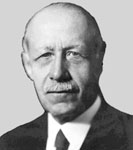Chapter 4. "Ethics Are Culturally Relative" by Charles A. Ellwood

Charles A. Ellwood, American Sociological Association
About the author…
Charles A. Ellwood (1873-1946) was the 14th President of the American Sociological Society, now known as the American Sociological Association. As a Professor of Sociology at the University of Missouri, he studied the conditions of the county almshouses and jails in Missouri. In the short reading selection below, Ellwood explains why "Morality…is not anything arbitrarily designed by the group, but is a standard of conduct which necessities of social survival require."
About the work…
In his Sociology and Modern Social Problems,[1] Ellwood outlines the origin of moral codes and ethics in terms of the competition and conflict inherent in the evolution and development of sociological groups. He maintains that morality is a consequence of survival, and, in light of these studies, the study of morality can now be considered an essential part of sociology. The consequences of this reading would seem to imply that ethics is culturally relative to the specific times and conditions of disparate societies—a sociological view expounded also by Edward Westermarck, William Graham Sumner, and Ruth Benedict.
Ideas of Interest from "The Study of Society"
According to Ellwood, what is the major factor occasioning war? Why is this so?
What have been the major effects of war on social development?
How does Ellwood account for the origin of a group code of ethics?
What are some of the ways struggle and competition among human beings is manifested?
What are the reasons provided in this reading for the view that social progress depends upon conflict and competition? Explain whether you agree with this view.
How does Ellwood describe the origin of moral codes?